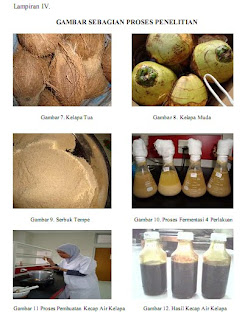ABSTRACT
This study aims to determine the role of molds and bacteria resistant salt in soy sauce of coconut water, the effect of four treatment variations of coconut water quality soy sauce, as well as determine the protein content of four soy sauce results of research and two commercial soy sauce as a comparison.
The study lasted two months, the exact starting May 29 until June 27, 2009. Place of research in microbiology laboratory UIN Sunan Kalijaga Yogyakarta, in the laboratory of physics of UIN Sunan Kalijaga Yogyakarta and in the Central Health Laboratory (BLK) Yogyakarta. This study uses descriptive method, where each presented research results achieved by complete.
The results indicate a role of fungi and bacteria resistant salt in soy sauce of coconut milk. Fungi and bacteria produce several enzymes that can transform organic compounds (carbohydrates, proteins and fat) into inorganic compounds, which makes the black soy sauce, thick and has a specific aroma. Four variations of the treatment (water moromi old coconut, young coconut water moromi, moromi distilled water and distilled water without moromi) can affect the quality of the soy sauce of coconut milk. Sweet soy sauce without moromi protein has a value greater than moromi soy sauce (soy sauce). soy sauce moromi more durable than the soy sauce and soy sauce without moromi smelling moromi while the fragrant smells of soy without the unpleasant moromi.
The value of protein in each sample of soy sauce: soy sauce water amounting to 3.18% old oil, soy sauce young coconut water at 2.32%, soy sauce 2.75% distilled water, sweet soy sauce for 4.41% distilled water, sweet soy sauce commercial "X" of 2.75% and the commercial soy sauce "XX" 4.73%.
Key words: inoculum, soy sauce of coconut milk, protein value

0 comments:
Post a Comment
coment plase